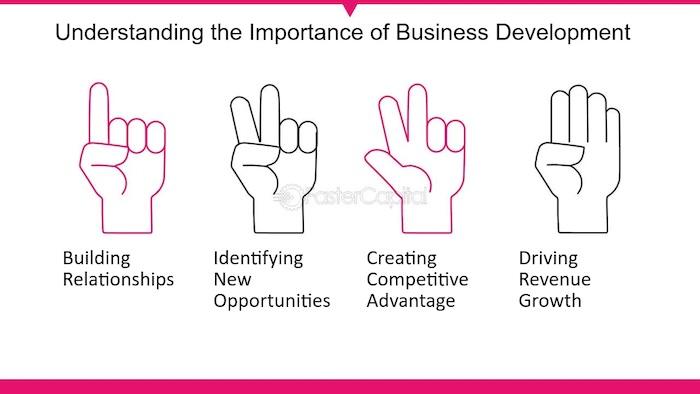In today’s competitive business landscape, organizations constantly seek ways to grow and adapt. One critical aspect of this growth is understanding what business development is and how it can be effectively implemented. This comprehensive guide delves into the essence of business development, its benefits, strategies, common pitfalls, and answers frequently asked questions to provide a clear roadmap for sustainable success.
What Is Business Development?
Business development refers to the process of identifying, nurturing, and acquiring new clients and business opportunities to drive growth and profitability. It encompasses a range of activities aimed at expanding a company’s reach, establishing strategic partnerships, and enhancing overall market presence.
Key Components of Business Development
-
Market Research and Analysis
Understanding the target audience, market trends, and competitive landscape is foundational. This involves gathering data to make informed decisions about where and how to grow.
-
Strategic Partnerships
Forming alliances with other organizations can open new avenues for growth, such as co-branding opportunities or joint ventures.
-
Sales and Marketing Alignment
Ensuring that sales and marketing teams work cohesively enhances lead generation and conversion rates.
-
Product Development
Innovating and improving products or services to meet evolving customer needs keeps the business relevant and competitive.
Benefits of Business Development
-
Revenue Growth
Effective business development strategies lead to increased sales and higher revenue streams.
-
Market Expansion
Entering new markets or segments allows businesses to reach a broader customer base.
-
Brand Enhancement
Strategic initiatives can elevate brand reputation and recognition in the marketplace.
-
Risk Mitigation
Diversifying products, services, or markets reduces dependency on a single revenue source, thereby spreading risk.
Effective Business Development Strategies
-
Networking
Building and maintaining relationships within the industry can lead to new opportunities and collaborations.
-
Referrals
Encouraging satisfied customers to refer others can organically grow the client base.
-
Thought Leadership
Establishing authority through content marketing, such as blogs or webinars, can attract potential clients.
-
Market Penetration
Increasing market share in existing markets through competitive pricing or enhanced marketing efforts.
-
Market Development
Exploring and entering new markets or geographical areas to expand reach.
-
Product Diversification
Developing new products or services to cater to different customer needs or preferences.
Common Mistakes in Business Development
-
Lack of Clear Strategy
Without a well-defined plan, efforts can be unfocused and ineffective.
-
Neglecting Customer Needs
Failing to understand and address customer pain points can lead to missed opportunities.
-
Overlooking Competitor Actions
Ignoring competitors’ strategies can result in lost market share.
-
Inconsistent Branding
A fragmented brand message can confuse potential clients and weaken market position.
Frequently Asked Questions
Q1: What skills are essential for a business development professional?
A: Key skills include strategic thinking, communication, negotiation, sales expertise, and market analysis capabilities.
Q2: How does business development differ from sales?
A: While sales focus on closing deals and generating immediate revenue, business development is broader, encompassing strategic initiatives to position the company for long-term growth.
Q3: Can small businesses benefit from business development?
A: Absolutely. Implementing business development strategies can help small businesses identify growth opportunities, build partnerships, and increase market presence.
Q4: How do you measure the success of business development efforts?
A: Success can be measured through metrics such as revenue growth, number of new clients acquired, market share expansion, and the strength of strategic partnerships.
Q5: What role does digital marketing play in business development?
A: Digital marketing is crucial as it enhances online presence, engages a wider audience, and supports lead generation through various online channels.
Conclusion
Understanding what business development is and implementing effective strategies are vital for any organization’s growth and sustainability. By focusing on market research, strategic partnerships, and aligning sales with marketing efforts, businesses can unlock new opportunities and achieve long-term success. Avoiding common pitfalls and continuously adapting to market changes will further solidify a company’s position in the competitive landscape.
